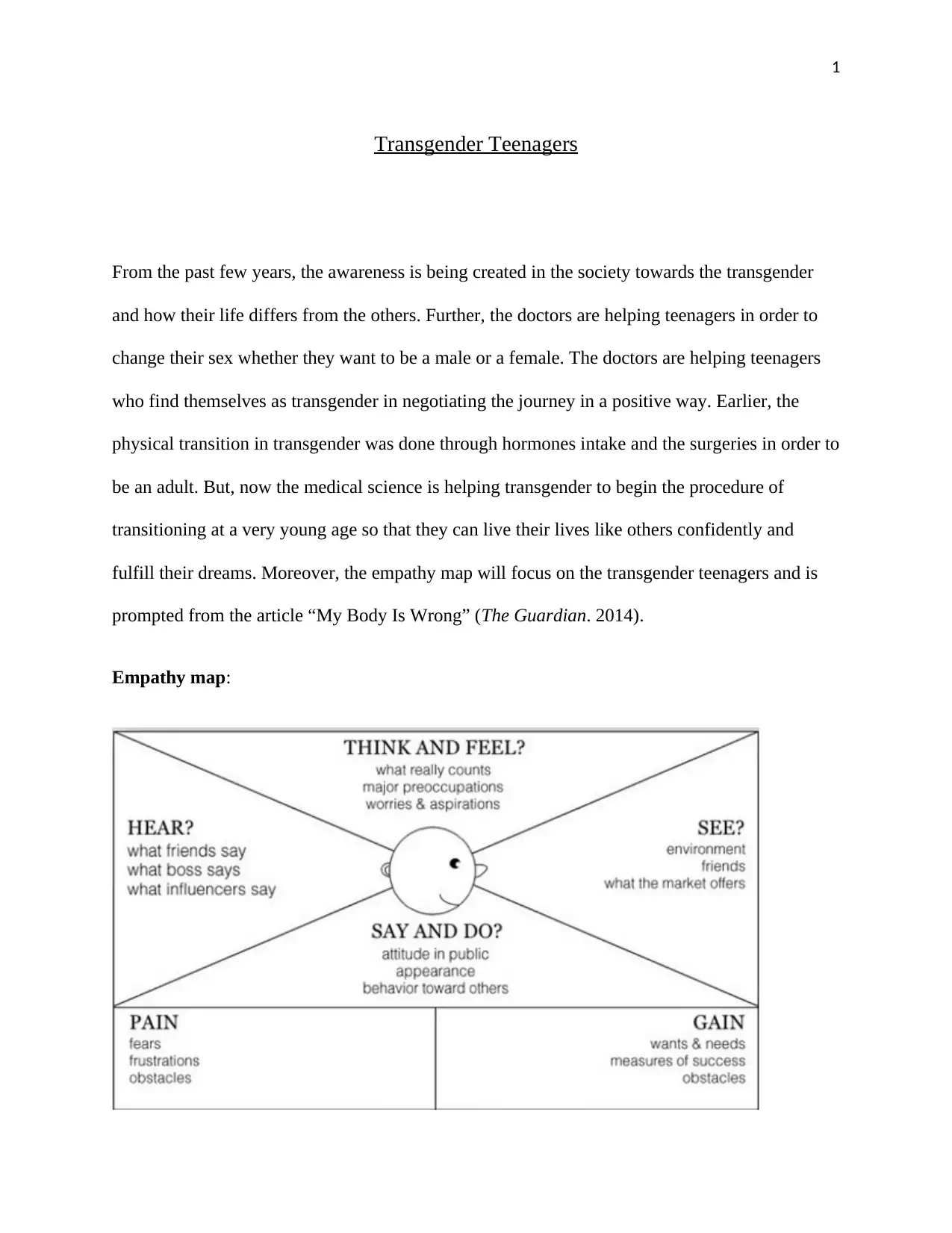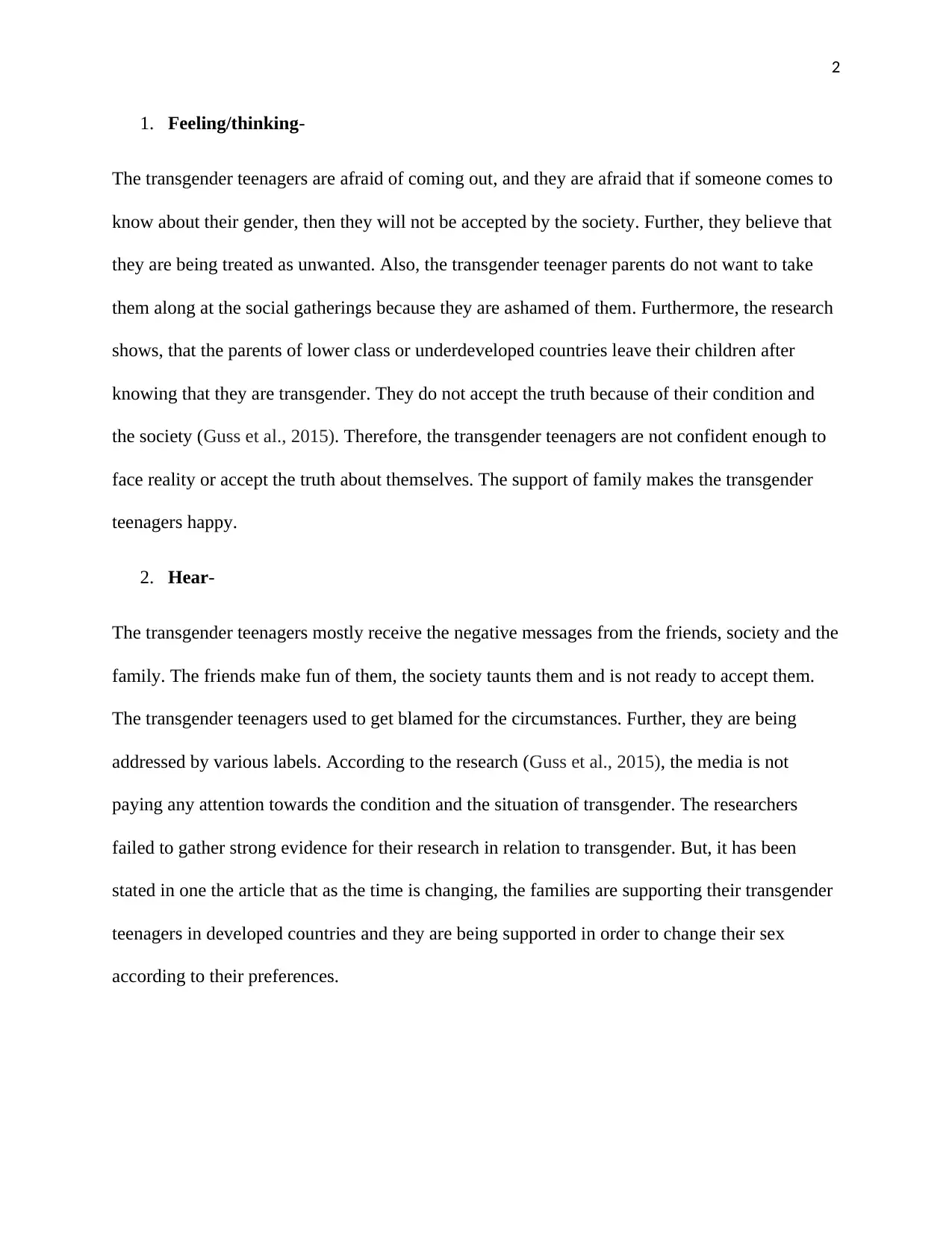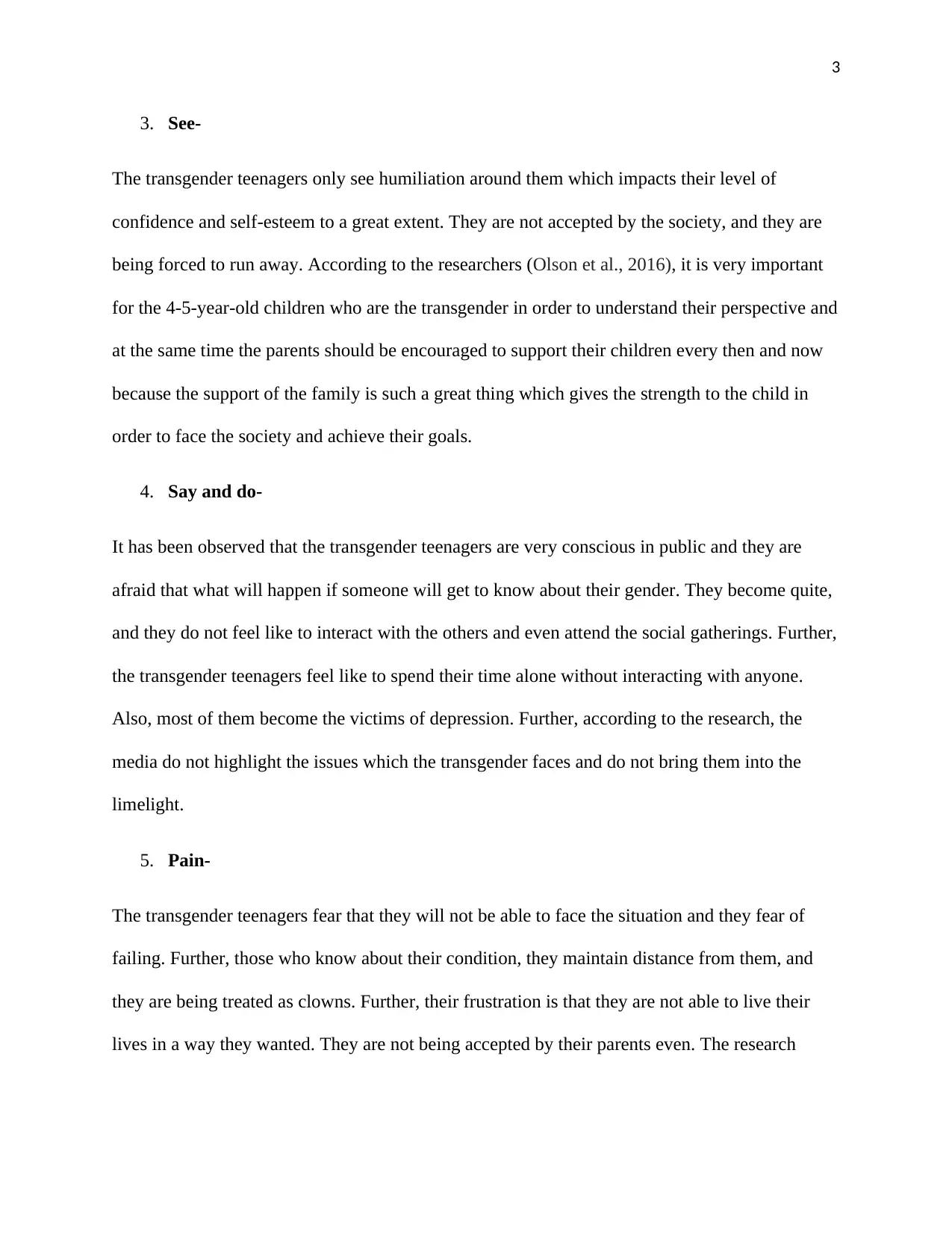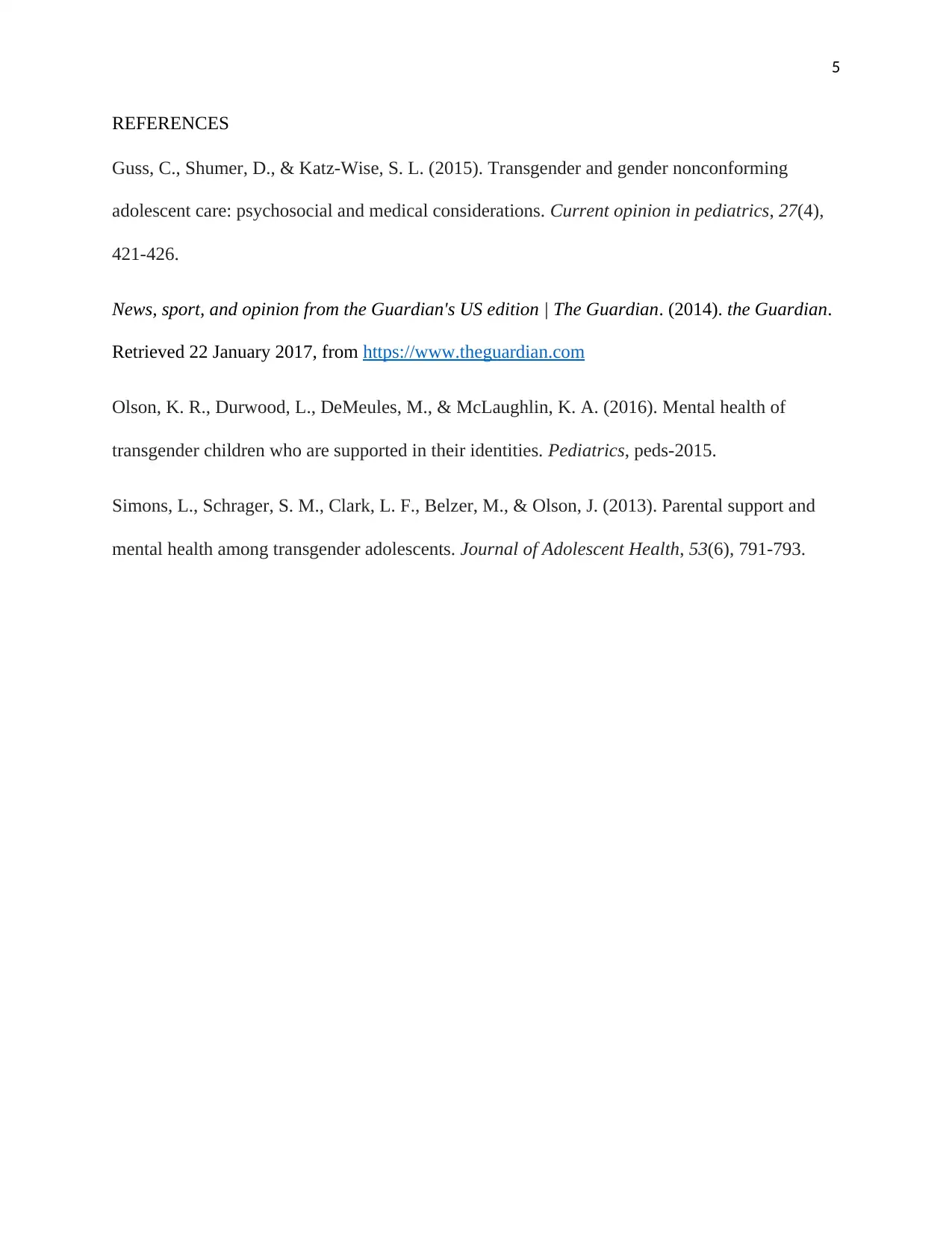Culture and Gender Perspective in Social Care
VerifiedAdded on 2019/09/16
|6
|1028
|390
Case Study
AI Summary
This document presents a case study focusing on transgender teenagers, utilizing an empathy map to explore their experiences and challenges. The empathy map delves into the feelings, thoughts, perceptions, and actions of transgender teenagers, highlighting the negative messages they receive from friends, society, and sometimes family. It also addresses the pain they endure due to lack of acceptance and the gains they seek, such as leading a normal life and receiving support. The case study references research articles to support its findings, emphasizing the importance of family support and societal acceptance for the mental health and well-being of transgender teenagers.

culture and gender perspective in social care
EMPATHY MAP
EMPATHY MAP
Paraphrase This Document
Need a fresh take? Get an instant paraphrase of this document with our AI Paraphraser

1
Transgender Teenagers
From the past few years, the awareness is being created in the society towards the transgender
and how their life differs from the others. Further, the doctors are helping teenagers in order to
change their sex whether they want to be a male or a female. The doctors are helping teenagers
who find themselves as transgender in negotiating the journey in a positive way. Earlier, the
physical transition in transgender was done through hormones intake and the surgeries in order to
be an adult. But, now the medical science is helping transgender to begin the procedure of
transitioning at a very young age so that they can live their lives like others confidently and
fulfill their dreams. Moreover, the empathy map will focus on the transgender teenagers and is
prompted from the article “My Body Is Wrong” (The Guardian. 2014).
Empathy map:
Transgender Teenagers
From the past few years, the awareness is being created in the society towards the transgender
and how their life differs from the others. Further, the doctors are helping teenagers in order to
change their sex whether they want to be a male or a female. The doctors are helping teenagers
who find themselves as transgender in negotiating the journey in a positive way. Earlier, the
physical transition in transgender was done through hormones intake and the surgeries in order to
be an adult. But, now the medical science is helping transgender to begin the procedure of
transitioning at a very young age so that they can live their lives like others confidently and
fulfill their dreams. Moreover, the empathy map will focus on the transgender teenagers and is
prompted from the article “My Body Is Wrong” (The Guardian. 2014).
Empathy map:

2
1. Feeling/thinking-
The transgender teenagers are afraid of coming out, and they are afraid that if someone comes to
know about their gender, then they will not be accepted by the society. Further, they believe that
they are being treated as unwanted. Also, the transgender teenager parents do not want to take
them along at the social gatherings because they are ashamed of them. Furthermore, the research
shows, that the parents of lower class or underdeveloped countries leave their children after
knowing that they are transgender. They do not accept the truth because of their condition and
the society (Guss et al., 2015). Therefore, the transgender teenagers are not confident enough to
face reality or accept the truth about themselves. The support of family makes the transgender
teenagers happy.
2. Hear-
The transgender teenagers mostly receive the negative messages from the friends, society and the
family. The friends make fun of them, the society taunts them and is not ready to accept them.
The transgender teenagers used to get blamed for the circumstances. Further, they are being
addressed by various labels. According to the research (Guss et al., 2015), the media is not
paying any attention towards the condition and the situation of transgender. The researchers
failed to gather strong evidence for their research in relation to transgender. But, it has been
stated in one the article that as the time is changing, the families are supporting their transgender
teenagers in developed countries and they are being supported in order to change their sex
according to their preferences.
1. Feeling/thinking-
The transgender teenagers are afraid of coming out, and they are afraid that if someone comes to
know about their gender, then they will not be accepted by the society. Further, they believe that
they are being treated as unwanted. Also, the transgender teenager parents do not want to take
them along at the social gatherings because they are ashamed of them. Furthermore, the research
shows, that the parents of lower class or underdeveloped countries leave their children after
knowing that they are transgender. They do not accept the truth because of their condition and
the society (Guss et al., 2015). Therefore, the transgender teenagers are not confident enough to
face reality or accept the truth about themselves. The support of family makes the transgender
teenagers happy.
2. Hear-
The transgender teenagers mostly receive the negative messages from the friends, society and the
family. The friends make fun of them, the society taunts them and is not ready to accept them.
The transgender teenagers used to get blamed for the circumstances. Further, they are being
addressed by various labels. According to the research (Guss et al., 2015), the media is not
paying any attention towards the condition and the situation of transgender. The researchers
failed to gather strong evidence for their research in relation to transgender. But, it has been
stated in one the article that as the time is changing, the families are supporting their transgender
teenagers in developed countries and they are being supported in order to change their sex
according to their preferences.
⊘ This is a preview!⊘
Do you want full access?
Subscribe today to unlock all pages.

Trusted by 1+ million students worldwide

3
3. See-
The transgender teenagers only see humiliation around them which impacts their level of
confidence and self-esteem to a great extent. They are not accepted by the society, and they are
being forced to run away. According to the researchers (Olson et al., 2016), it is very important
for the 4-5-year-old children who are the transgender in order to understand their perspective and
at the same time the parents should be encouraged to support their children every then and now
because the support of the family is such a great thing which gives the strength to the child in
order to face the society and achieve their goals.
4. Say and do-
It has been observed that the transgender teenagers are very conscious in public and they are
afraid that what will happen if someone will get to know about their gender. They become quite,
and they do not feel like to interact with the others and even attend the social gatherings. Further,
the transgender teenagers feel like to spend their time alone without interacting with anyone.
Also, most of them become the victims of depression. Further, according to the research, the
media do not highlight the issues which the transgender faces and do not bring them into the
limelight.
5. Pain-
The transgender teenagers fear that they will not be able to face the situation and they fear of
failing. Further, those who know about their condition, they maintain distance from them, and
they are being treated as clowns. Further, their frustration is that they are not able to live their
lives in a way they wanted. They are not being accepted by their parents even. The research
3. See-
The transgender teenagers only see humiliation around them which impacts their level of
confidence and self-esteem to a great extent. They are not accepted by the society, and they are
being forced to run away. According to the researchers (Olson et al., 2016), it is very important
for the 4-5-year-old children who are the transgender in order to understand their perspective and
at the same time the parents should be encouraged to support their children every then and now
because the support of the family is such a great thing which gives the strength to the child in
order to face the society and achieve their goals.
4. Say and do-
It has been observed that the transgender teenagers are very conscious in public and they are
afraid that what will happen if someone will get to know about their gender. They become quite,
and they do not feel like to interact with the others and even attend the social gatherings. Further,
the transgender teenagers feel like to spend their time alone without interacting with anyone.
Also, most of them become the victims of depression. Further, according to the research, the
media do not highlight the issues which the transgender faces and do not bring them into the
limelight.
5. Pain-
The transgender teenagers fear that they will not be able to face the situation and they fear of
failing. Further, those who know about their condition, they maintain distance from them, and
they are being treated as clowns. Further, their frustration is that they are not able to live their
lives in a way they wanted. They are not being accepted by their parents even. The research
Paraphrase This Document
Need a fresh take? Get an instant paraphrase of this document with our AI Paraphraser

4
shows that the frustration and the barriers force the teenagers to commit suicide and end their
lives because they are unable to cope up with the situation (Simons et al., 2013).
6. Gain-
The transgender teenagers want that they should also lead a normal life like others and further be
accepted by the family and the society. They want to fulfill their goals and wants to live a life in
a way they want i.e. a male or a female. Also, they want that their parents support them at every
step in order to remain encouraged.
shows that the frustration and the barriers force the teenagers to commit suicide and end their
lives because they are unable to cope up with the situation (Simons et al., 2013).
6. Gain-
The transgender teenagers want that they should also lead a normal life like others and further be
accepted by the family and the society. They want to fulfill their goals and wants to live a life in
a way they want i.e. a male or a female. Also, they want that their parents support them at every
step in order to remain encouraged.

5
REFERENCES
Guss, C., Shumer, D., & Katz-Wise, S. L. (2015). Transgender and gender nonconforming
adolescent care: psychosocial and medical considerations. Current opinion in pediatrics, 27(4),
421-426.
News, sport, and opinion from the Guardian's US edition | The Guardian. (2014). the Guardian.
Retrieved 22 January 2017, from https://www.theguardian.com
Olson, K. R., Durwood, L., DeMeules, M., & McLaughlin, K. A. (2016). Mental health of
transgender children who are supported in their identities. Pediatrics, peds-2015.
Simons, L., Schrager, S. M., Clark, L. F., Belzer, M., & Olson, J. (2013). Parental support and
mental health among transgender adolescents. Journal of Adolescent Health, 53(6), 791-793.
REFERENCES
Guss, C., Shumer, D., & Katz-Wise, S. L. (2015). Transgender and gender nonconforming
adolescent care: psychosocial and medical considerations. Current opinion in pediatrics, 27(4),
421-426.
News, sport, and opinion from the Guardian's US edition | The Guardian. (2014). the Guardian.
Retrieved 22 January 2017, from https://www.theguardian.com
Olson, K. R., Durwood, L., DeMeules, M., & McLaughlin, K. A. (2016). Mental health of
transgender children who are supported in their identities. Pediatrics, peds-2015.
Simons, L., Schrager, S. M., Clark, L. F., Belzer, M., & Olson, J. (2013). Parental support and
mental health among transgender adolescents. Journal of Adolescent Health, 53(6), 791-793.
⊘ This is a preview!⊘
Do you want full access?
Subscribe today to unlock all pages.

Trusted by 1+ million students worldwide
1 out of 6
Related Documents
Your All-in-One AI-Powered Toolkit for Academic Success.
+13062052269
info@desklib.com
Available 24*7 on WhatsApp / Email
![[object Object]](/_next/static/media/star-bottom.7253800d.svg)
Unlock your academic potential
Copyright © 2020–2026 A2Z Services. All Rights Reserved. Developed and managed by ZUCOL.





